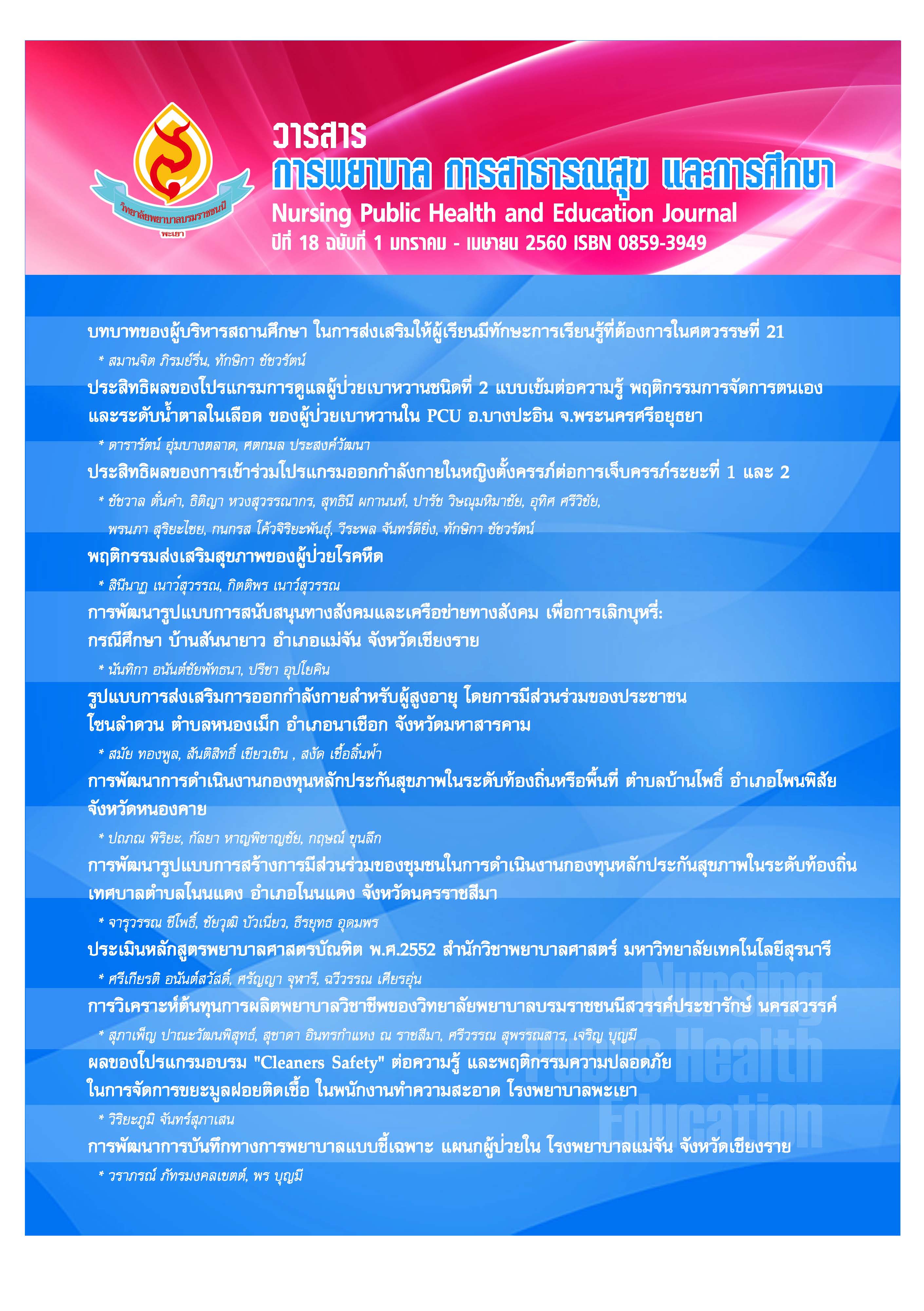ประเมินหลักสูตรพยาบาลศาสตรบัณฑิต พ.ศ.2552 สำนักวิชาพยาบาลศาสตร์ มหาวิทยาลัยเทคโนโลยีสุรนารี
คำสำคัญ:
ประเมินหลักสูตร พยาบาลศาสตรบัณฑิต มหาวิทยาลัยเทคโนโลยีสุรนารี, Bachelor of Nursing Science, Curriculum evaluation, Suranaree University of Technologyบทคัดย่อ
การวิจัยนี้เป็นการประเมินหลักสูตรพยาบาลศาสตรบัณฑิต พ.ศ.2552 ของสำนักวิชาพยาบาลศาสตร์ มหาวิทยาลัยเทคโนโลยีสุรนารี โดยใช้การประเมินตามรูปแบบซิปโมเดล (CIPP Model) มีวัตถุประสงค์เพื่อประเมินหลักสูตรในองค์ประกอบ 4 ด้าน ได้แก่ ด้านบริบท ด้านปัจจัยนำเข้า ด้านกระบวนการผลิต และด้านผลผลิต เก็บรวบรวมข้อมูลจากประชากรทั้งหมด ได้แก่ อาจารย์และผู้บริหาร 15 คน บัณฑิต 35 คน ผู้ใช้บัณฑิต 36 คนและนักศึกษาพยาบาล 86 คน รวม 172 คน เครื่องมือที่ใช้ในการวิจัยเป็นแบบสอบถามประมาณค่า5 ระดับที่มีคำถามปลายเปิดแบ่งเป็น 4 ส่วน ตรวจสอบดัชนีความตรงเชิงเนื้อหาทั้งฉบับ (Scale-Content validity index: S-CVI) จากผู้เชี่ยวชาญ 3 ท่าน ได้ค่า 0.98 นำมาหาค่าความเชื่อมั่นตอนที่ 1-4 ได้ 0.98, 0.97, 0.98 และ0.98 ตามลำดับ ผู้วิจัยเก็บรวบรวมข้อมูลด้วยตนเองและทางไปรษณีย์ วิเคราะห์ข้อมูลโดยใช้สถิติเชิงบรรยายผลการวิจัยพบว่า1) ด้านบริบท พบว่า 1.1) จุดมุ่งหมายของหลักสูตรมีความชัดเจน นำไปปฏิบัติได้จริง สอดคล้องกับความต้องการของสังคม และสอดคล้องกับเอกลักษณ์วิชาชีพพยาบาลในระดับมากถึงมากที่สุด 1.2) โครงสร้างหลักสูตรมีความเหมาะสม โดยเฉพาะหมวดวิชาเฉพาะทั้งกลุ่มวิชาพื้นฐานวิชาชีพ และกลุ่มวิชาชีพ และหมวดวิชาเลือกเสรี และ 1.3) เนื้อหาสาระรายวิชามีความสอดคล้องกับจุดมุ่งหมายของหลักสูตร มีความน่าสนใจและทันสมัย จำนวนหน่วยกิต การจัดการเรียนการสอนและการวัดประเมินผลมีความเหมาะสมในระดับมากโดยเฉพาะหมวดวิชาเฉพาะกลุ่มวิชาชีพ 2) ด้านปัจจัยนำเข้า พบว่า 2.1) อาจารย์เป็นผู้ที่มีความสำคัญมากต่อการจัดการเรียนรู้ที่มีคุณภาพและสอดแทรกคุณธรรมจริยธรรม 2.2) คุณลักษณะของผู้เรียนที่มีความเมตตา กรุณาและความสัมพันธ์อันดีกับผู้รับบริการ และความสามารถในการทำงานร่วมกันเป็นทีมและ 2.3) ปัจจัยเอื้อต่อการจัดการเรียนการสอน ที่เพียงพอ เหมาะสม สะดวกในการเข้าถึงบริการ จะช่วยเอื้อต่อการเรียนรู้ของผู้เรียน 3) ด้านกระบวนการผลิต พบว่า การเตรียมการหลักสูตรและประเมินผลหลักสูตรมีความเหมาะสม มีระบบจัดการเรียนการสอนและการประเมินผลการเรียนรู้ที่ดี และยังมีการปลูกฝังคุณธรรมจริยธรรม จรรยาบรรณวิชาชีพ 4) ด้านผลผลิต พบว่า คุณลักษณะเชิงวิชาชีพด้านภูมิธรรมในภาพรวมอยู่ในระดับมากถึงมากที่สุดคุณลักษณะเชิงวิชาชีพด้านภูมิรู้และด้านภูมิปัญญา อยู่ในระดับปานกลางถึงมากผลการศึกษาช่วยให้ได้ข้อมูลจำเป็นในการปรับกระบวนการของหลักสูตรเพื่อพัฒนาสมรรถนะของผู้เรียน โดยเฉพาะด้านความรู้และทักษะทางปัญญา
Curriculum evaluation for Bachelor of Nursing Science,
School of Nursing, Suranaree University of Technology
This descriptive research aimed to examine the curriculum of Nursing Science Program B.E. 2009 ofSuranaree University of Technology (SUT) using Concept, Input, Process and Output (CIPP) model. The purpose of the study was to evaluate four specific factors: 1) the context, 2) input factors, 3) process of program and 4) product of program. The total population of 172 includes 15 administrator and faculty of nursing, 35 graduate, 36 employer and 86 nursing students. The research instrument were 4 set of5–point rating scale with open-ended questionnaire, validated by 3 experts. Scale-content validity index (S-CVI) were0.98. The reliability were0.98,0.97, 0.98 and 0.98, respectively. Data were analyzed by using descriptive statistics. The results showed that: 1) Context:1.1) The objectives of the program were concise, applicable, congruent with social needs and represented the identity of the nursing profession at a high level. 1.2) The structure of the program was appropriate especially the professional courses (fundamental and professional of nursing) and elective courses and 1.3) Course contents corresponded with course objectives, significant and up-to-date. This program was appropriate in terms of credit hours and teaching and learning methods. Moreover, the evaluating methods for professional courses (professional of nursing) were rated at a high level. 2) Input factors:2.1) Nursing instructors played an important role in designing effective learning methods with morals and ethics. 2.2) Kindness, good relationship with the clients and ability to work well as a team were significant attribute in nursing students. And 2.3) Adequacy, suitability and easy access of service were contributing factors to facilitate student learning. 3) Process of program: Curriculum preparation and evaluation were appropriate with effective teaching, learning and evaluating systems as well as developing morals and professional ethics. 4) Product of program:Moral ethos of the professional characteristicsof SUT nursing student achieved a high-to-higher level while their knowledge and wisdom were at a moderate-to-high level.This study provides essential information to adjust the curriculum in order to develop the competencies of nursing students, particularly their knowledge and intellectual skills.



